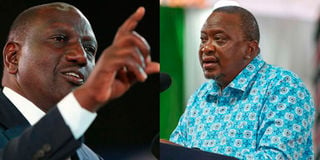Premium
Uhuru’s political life is marked by a penchant for walking away

President William Ruto (left) and his former boss, Uhuru Kenyatta.
President Uhuru Kenyatta has concurred with Deputy President William Ruto that he wanted to quit the repeat presidential election after the Supreme Court nullified their victory on September 1, 2017.
It was a rare concurrence since President Kenyatta’s handshake with the then opposition leader Raila Odinga in March 2018. But it was more hilarious to watch sycophants, naysayers and outsiders in the Jubilee family at the time go to the stumps with ridiculous claims that what the DP had said was untrue.
Slap that never was
They placed a very costly premium on Dr Ruto’s slap-that-never-was comment, including playing the audio at public rallies. To the Azimioists, they had got a handle to the vote-rich Mt Kenya region. Throwing basic intelligence out through the window, they harped at it for two days. Then they recoiled, and coiled their tails between their legs.
As usual, they had not seen the landmine right before their very eyes. Were they telling the Mt Kenya bloc that it would have been okay for President Kenyatta to abandon the presidential bid at that crucial time?
Mr Kenyatta had won a comfortable 54 per cent of the vote, and the Jubilee Party had raked in more than 800 of 1,400 ward reps, 172 MPs, 34 senators and 25 governors. It was a resounding mandate from the people of Kenya. It would have been a dereliction of duty to walk away.
Was the Azimio message to the region, and indeed Kenya, that the President should have walked away at the sight of difficulties? How would it have been had he done so? Definitely, the post-election situation would have deteriorated.
With the merchants of violence running amok in the city, towns and markets, such a move from the Head of State would have added fuel to the raging fires.
And by telling the President that there was no way he could walk away, the Deputy President did the right thing for God and country.
It was the best advice to give at the time from a deputy, a friend and a political soulmate. If Dr Ruto was power-hungry, he could have said: “No problem, I will take your place.”
It goes without saying that had President Kenyatta abandoned his cardinal duties courtesy of a mere nullification of his election, Jubilee members would have lined up behind Dr Ruto to a man and woman, old and young, party official and rank and file, all together.
In any case, nullification of the presidential election did not invalidate the other five levels of the general election. All that was needed was to solidify the 54 per cent presidential vote or even push it higher.
Higher moral route
Just cross to the other side of the 2017 political aisle and imagine what would have happened, what they would have done, if they were in Dr Ruto’s shoes. The side opposite would have jumped at the opportunity with all the alacrity they could muster. But unlike them, the DP took the higher moral route. Here was his leader giving up at a time when the country required a steady hand.
If it were the other side, the story of that election would have been – if not for the violence – bigger, juicier and different. And this is not farfetched. In 2002, when President Mwai Kibaki was involved in a serious accident three weeks to the December election, it was said that a push-and-pull had started on who would replace the Narc presidential candidate.
Replace! The push was said to have been mightiest from the Kanu renegades who had abandoned the independence party at the twelfth hour to save their political lives after President Daniel Moi picked Mr Kenyatta – as he then was – as the party presidential flag-bearer.
Let’s start at the beginning. The President’s admission that he was ready to abandon the presidential repeat contest because he did not want bloodshed to engulf the country is rather unconvincing. If anything, it would have emboldened the opposition to do everything they could to implement their eternal mantra: Make the country ungovernable.
Surrender would have pushed a worse situation to the worst.
Since he joined electoral politics in 1997, President Kenyatta has had the knack for walking away from contests over this or that hiccup.
When he lost the Gatundu South seat that year, with more than a double margin, it is said he had felt that competitive politics was not his thing. But President Moi pulled him back in 2001, and the rest is history. Well, but not quite.
Ceded his bid
In December 2012, a mere three months to the 2013 March election, President Kenyatta’s supporters in the Jubilee coalition were shocked to hear that he had ceded his presidential bid to his then counterpart, Deputy Prime Minister Musalia Mudavadi.
However, supporters of President Kenyatta’s The National Alliance were up in arms against the deal and threatened to vote for his perennial rival, Mr Odinga.
He beat a hasty retreat and blamed demons for the push to withdraw. Then there was, of course, 2017.
The writer works in the William Ruto presidential campaign; [email protected]





